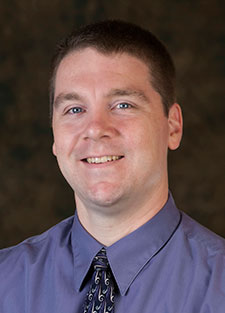An adjunct faculty member at Pennsylvania College of Technology was an invited panelist at the 2013 Meeting of the Middle Atlantic Discovery Chemistry Project.
Matthew R. Eisley, part-time instructor of chemistry, presented “Early Stages of the Implementation of a Flipped Classroom.” The presentation was part of a panel discussion titled “The Flipped Classroom: Applications and Examples – College and High School.”
 Other members of the panel were Jessica Fautch, of York College of Pennsylvania; Kim Wiest, of Governor Mifflin Senior High School; and Esther Gibbs, of Goucher College.
Other members of the panel were Jessica Fautch, of York College of Pennsylvania; Kim Wiest, of Governor Mifflin Senior High School; and Esther Gibbs, of Goucher College.
A “flipped classroom” moves lectures online, outside of class, and moves assignments into the classroom, where teachers can provide guidance and answer questions.
The 2013 MADCP Meeting was held May 17-18 at Penn State Berks. The project is an informal association of high school through university-level faculty in the mid-Atlantic region who are interested in a discovery-based or inquiry-based approach to teaching and learning in the chemistry classroom and laboratory.
Eisley holds bachelor’s degrees in chemistry and secondary education, both from Lock Haven University, and a master’s degree in instructional technology from Bloomsburg University of Pennsylvania.
In addition to teaching at Penn College, he is a faculty member at South Williamsport Area Junior/Senior High School. In 2009, he was recognized as a Keystone Technology Integrator, and in 2011, he became a STAR Discovery Educator.
For more about Penn College, email the Admissions Office or call toll-free 800-367-9222.
Matthew R. Eisley, part-time instructor of chemistry, presented “Early Stages of the Implementation of a Flipped Classroom.” The presentation was part of a panel discussion titled “The Flipped Classroom: Applications and Examples – College and High School.”
 Other members of the panel were Jessica Fautch, of York College of Pennsylvania; Kim Wiest, of Governor Mifflin Senior High School; and Esther Gibbs, of Goucher College.
Other members of the panel were Jessica Fautch, of York College of Pennsylvania; Kim Wiest, of Governor Mifflin Senior High School; and Esther Gibbs, of Goucher College.A “flipped classroom” moves lectures online, outside of class, and moves assignments into the classroom, where teachers can provide guidance and answer questions.
The 2013 MADCP Meeting was held May 17-18 at Penn State Berks. The project is an informal association of high school through university-level faculty in the mid-Atlantic region who are interested in a discovery-based or inquiry-based approach to teaching and learning in the chemistry classroom and laboratory.
Eisley holds bachelor’s degrees in chemistry and secondary education, both from Lock Haven University, and a master’s degree in instructional technology from Bloomsburg University of Pennsylvania.
In addition to teaching at Penn College, he is a faculty member at South Williamsport Area Junior/Senior High School. In 2009, he was recognized as a Keystone Technology Integrator, and in 2011, he became a STAR Discovery Educator.
For more about Penn College, email the Admissions Office or call toll-free 800-367-9222.
